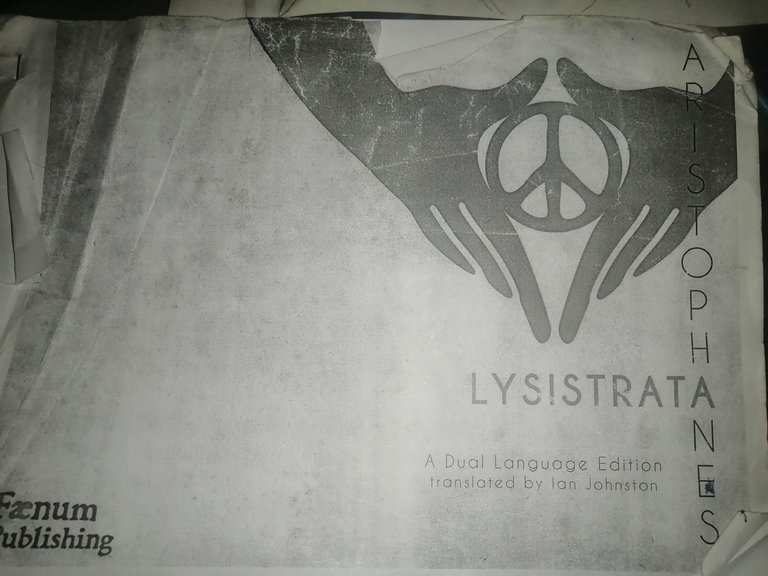
Good day readers! This is my first post in the @hivebookclub community. Hope you all enjoy my review. So we recently read and analysed Aristophanes's Lysistrata in my class. I wondered, why don't I share the review on the "Hivebookclub". It's a very interesting play and I'm sure you all would love to know what's it about.
Aristophanes's Lysistrata is an unconventional one in our modern era but I loved the style and the plot of the whole story.
It's basically Aristophanes's remake of the Peloponessian war between Athens and Sparta that lasted for about 27 years. Aristophanes creates his own version of the story which ends in peace and not in Athens defeat this time.
How did it end in peace?
The Protagonist in the plot is a woman called Lysistrata. Found out the meaning of her name is "Army Disbander" and she literally lived up to it. You may be wondering, a woman in a play about war? How did she bring peace? Well stay tuned and all these questions will be answered hehe.
The play opens with Lysistrata's call for women from both Athens and Spartan to strike a deal. To me it was quite a hard one but as they say, desperate times call for desperate measures. Lysistrata asks the women to go on a sex strike. They were hesitant at first but after seeing the prospects of it, they all agreed.
The play is a unique one because of the presence of old comedy in it. The language is mainly sexual and bawdy. The women in the play talked about any and everything rated +18, even dildo!!!
I love how the play also presented women and intelligent and strong, also as a united force. Lysistrata defeats the wits of the magistrate in an argument making him frustrated and even resort to using invectives against her. The old women in the play were also a strong force against the old men. They stood their ground against the old men and won at the end.
The height of all sexual imagery in the play was when a naked girl called Reconciliation was brought to bring peace. The Athenian men and Spartan men pointed to her private parts referring to them as different lands to be shared for peace to reigned.
Well, at last peace reigned and this was mainly through the wits and intelligence of Lysistrata. She makes us know that women are not only useful in the house or in the beds rather they go far beyond that. They can do whatever, she even lets us know that war is not only a man's thing but a woman's. Also, the negative consequences of war are felt by both the men and women.
I really enjoyed reading the play, because of the dialogue and so many other interesting dramatic techniques that were used to advance the plot of the play. Hope you all enjoyed my review, see ya!
Hace poco leímos y analizamos "Lisístrata" de Aristófanes en mi clase. Me pregunté, ¿por qué no comparto la reseña en el "Hivebookclub"? "Lisístrata" de Aristófanes es algo inconvencional en nuestra era moderna, pero me encantó el estilo y la trama de toda la historia.
Básicamente, Aristófanes recrea la guerra del Peloponeso entre Atenas y Esparta que duró alrededor de 27 años. Aristófanes crea su propia versión de la historia que termina en paz y no en la derrota de Atenas esta vez. ¿Cómo terminó en paz?
La protagonista de la trama es una mujer llamada Lisístrata. Descubrí que el significado de su nombre es "Disolutora de Ejércitos" y ella literalmente estuvo a la altura de ello. Puede que te estés preguntando, ¿una mujer en una obra sobre la guerra? ¿Cómo logró traer la paz? Bueno, mantente atento y todas estas preguntas serán respondidas jaja.
La obra comienza con el llamado de Lisístrata a las mujeres de Atenas y Esparta para llegar a un acuerdo. Para mí, fue bastante difícil, pero como dicen, tiempos desesperados requieren medidas desesperadas. Lisístrata pide a las mujeres que se declaren en huelga sexual. Al principio, dudaron, pero después de ver las perspectivas, todas estuvieron de acuerdo.
La obra es única debido a la presencia de la comedia antigua en ella. El lenguaje es principalmente sexual y obsceno. Las mujeres en la obra hablaban de cualquier cosa clasificada como +18, ¡incluso de un consolador!
Me encanta cómo la obra también presenta a las mujeres como inteligentes y fuertes, además de como una fuerza unida. Lisístrata derrota la sagacidad del magistrado en una discusión, haciéndolo frustrar e incluso recurrir a usar injurias contra ella. Las mujeres mayores en la obra también fueron una fuerza fuerte contra los hombres mayores. Mantuvieron su posición contra los hombres mayores y ganaron al final.
La cúspide de toda la imaginería sexual en la obra fue cuando una chica desnuda llamada Reconciliación fue llevada para traer la paz. Los hombres atenienses y espartanos señalaron sus partes íntimas refiriéndose a ellas como tierras diferentes que se compartirían para que reinara la paz.
Bueno, al final reinó la paz y esto se debió principalmente a la sagacidad e inteligencia de Lisístrata. Nos hace saber que las mujeres no solo son útiles en casa o en la cama, sino que van mucho más allá. Pueden hacer lo que sea, incluso nos hace saber que la guerra no es solo cosa de hombres, sino también de mujeres. Además, las consecuencias negativas de la guerra las sienten tanto hombres como mujeres.
Realmente disfruté leyendo la obra, debido al diálogo y a muchas otras técnicas dramáticas interesantes que se utilizaron para avanzar en la trama de la obra. ¡Espero que todos hayan disfrutado de mi reseña, nos vemos!